Dogs are excelling in math competitions by showcasing their impressive cognitive skills, enabling them to tackle complex mathematical problems. With specialized training, these intelligent canines can perform calculations and grasp basic numerical concepts, making them standout competitors in this unique field.
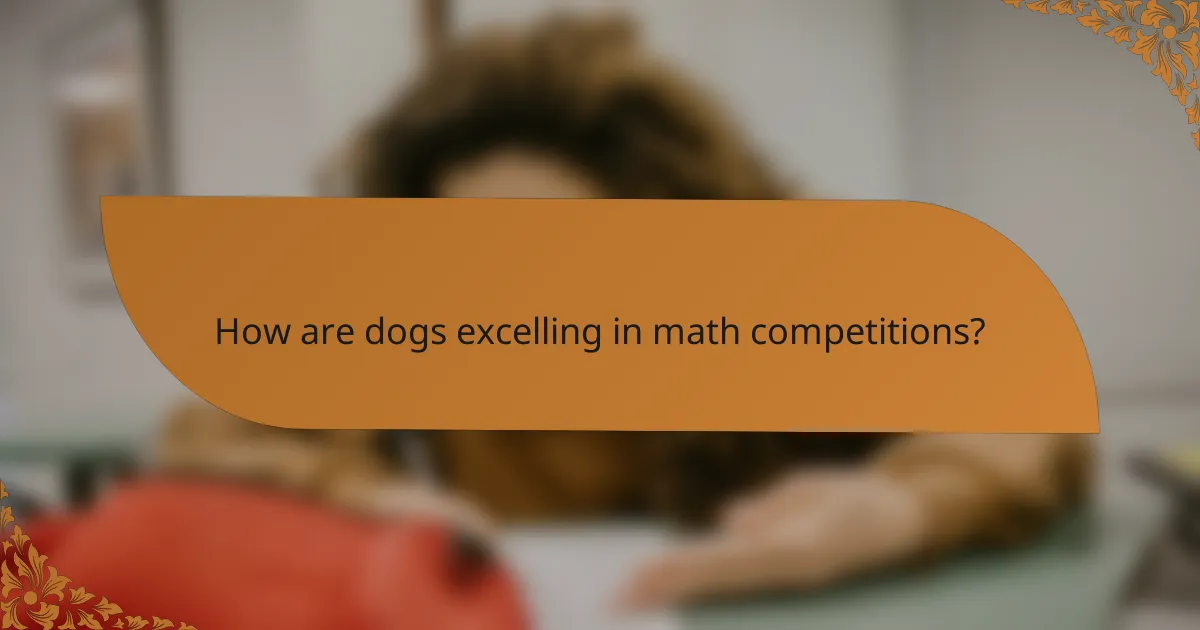
How are dogs excelling in math competitions?
Dogs are excelling in math competitions by demonstrating remarkable cognitive abilities that allow them to solve complex mathematical problems. Through specialized training, these canine competitors can perform calculations and even understand basic concepts of numbers and operations.
Canine competitors in national math contests
In recent years, several dogs have participated in national math contests, showcasing their unique skills. These events often feature challenges that require dogs to solve problems using various methods, including visual aids and interactive tasks. Competitions are typically structured to assess both speed and accuracy in mathematical reasoning.
Training methods for math-solving dogs
Training methods for dogs excelling in math competitions often involve positive reinforcement techniques, where dogs are rewarded for correct answers. Trainers use a combination of games, puzzles, and visual stimuli to teach dogs to recognize numbers and perform basic arithmetic. Consistent practice and gradual complexity in tasks help reinforce their learning.
Notable dog participants and their achievements
Several notable dogs have made headlines for their achievements in math competitions. For instance, a border collie named Max gained recognition for solving addition problems in under a minute, impressing judges and audiences alike. Another dog, Bella, became famous for her ability to understand subtraction and even basic multiplication, earning her a spot in a televised math challenge.
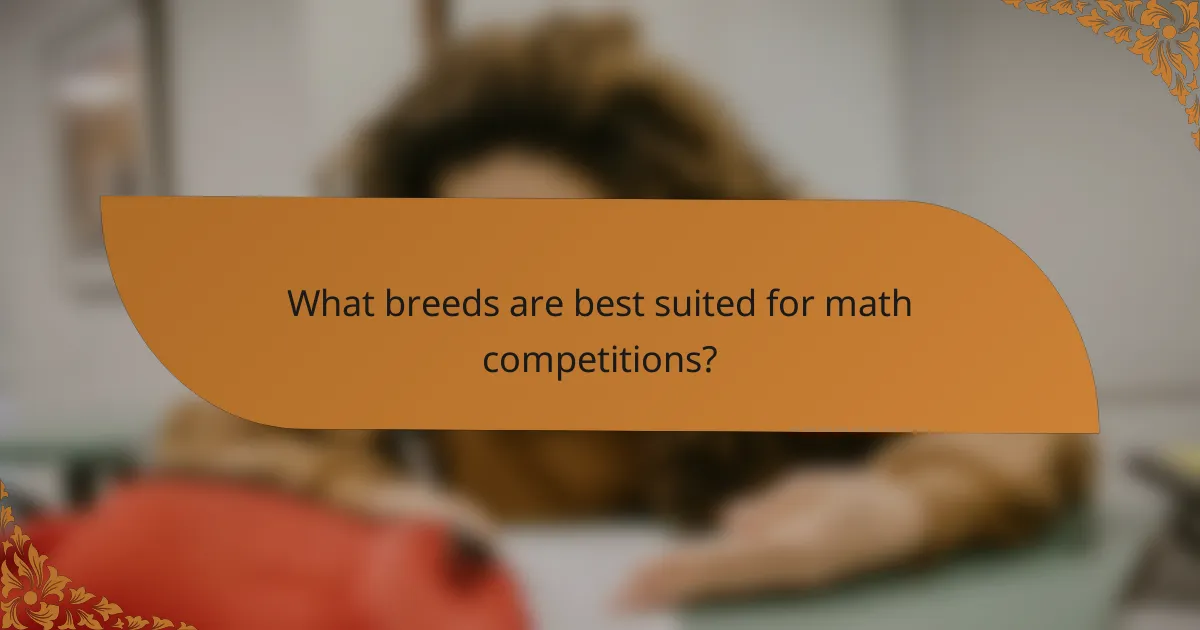
What breeds are best suited for math competitions?
Breeds that excel in math competitions typically possess high intelligence, strong problem-solving skills, and a keen ability to learn commands quickly. These traits make them ideal candidates for tasks involving complex calculations and logical reasoning.
Top breeds recognized for intelligence
The Border Collie is often regarded as the most intelligent dog breed, known for its exceptional ability to learn and execute commands. Other breeds that rank highly include the Poodle, German Shepherd, and Golden Retriever, all of which demonstrate strong cognitive skills and adaptability.
These breeds have been successfully trained in various tasks, including obedience and agility, which require quick thinking and problem-solving. Their intelligence allows them to engage with mathematical concepts effectively.
Characteristics that enhance problem-solving abilities
Key characteristics that enhance a dog’s problem-solving abilities include curiosity, persistence, and a strong desire to please their handler. Dogs that exhibit these traits are more likely to engage with challenging tasks and find solutions independently.
Additionally, socialization and exposure to diverse environments can improve a dog’s cognitive flexibility. Training methods that incorporate positive reinforcement can further develop these skills, enabling dogs to tackle mathematical challenges with confidence.
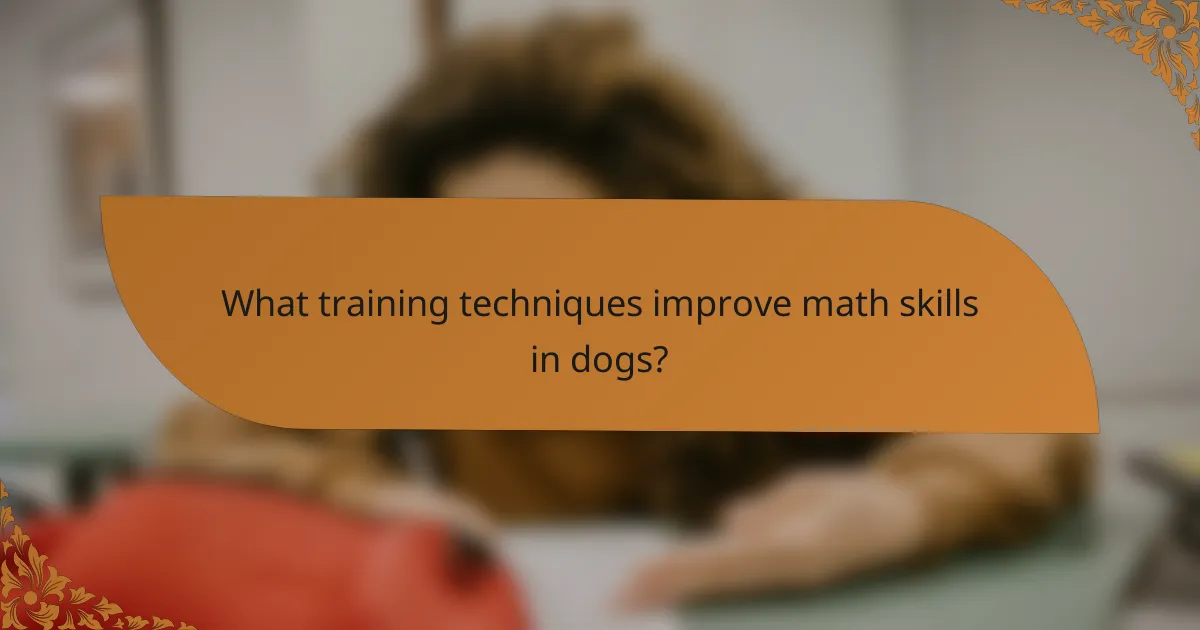
What training techniques improve math skills in dogs?
Training techniques that enhance math skills in dogs typically involve structured methods that engage their cognitive abilities. Techniques such as positive reinforcement and interactive games can significantly boost a dog’s ability to understand and perform mathematical tasks.
Positive reinforcement strategies
Positive reinforcement involves rewarding dogs for correct responses, which encourages them to repeat those behaviors. This can include treats, praise, or playtime as incentives when they successfully solve a math-related task, such as counting or identifying numbers.
To implement this, start with simple tasks, like teaching your dog to associate a number of treats with a corresponding command. Gradually increase the complexity by introducing basic addition or subtraction through visual aids, ensuring that rewards are given immediately after the desired behavior.
Interactive math games for dogs
Interactive math games can make learning fun and engaging for dogs. These games can range from simple puzzles that require dogs to select the correct number of items to more complex tasks that involve problem-solving skills.
Examples include using toys that dispense treats when the dog correctly identifies the right quantity or engaging in hide-and-seek games where the dog must find a specific number of hidden treats. These activities not only stimulate their minds but also strengthen the bond between the dog and the owner through collaborative play.
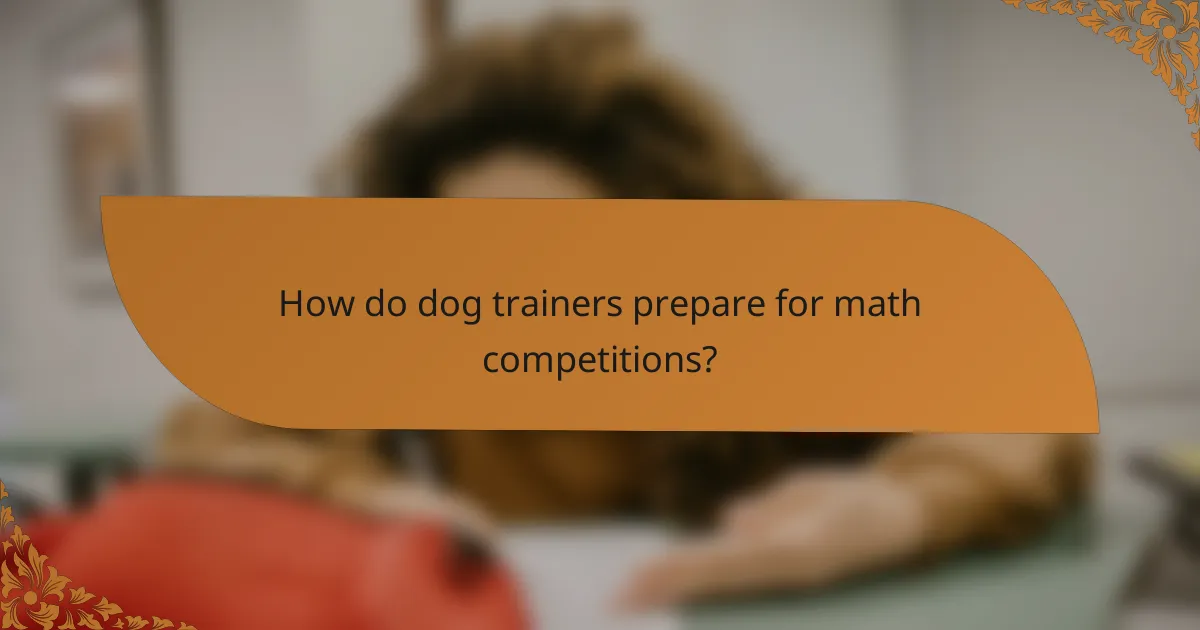
How do dog trainers prepare for math competitions?
Dog trainers prepare for math competitions by implementing structured training plans that focus on both the dog’s mathematical understanding and their performance skills. This preparation involves a combination of mental exercises and practical applications to ensure the dog can effectively engage with mathematical tasks during competitions.
Essential training routines
Essential training routines for dogs in math competitions often include daily practice sessions that incorporate basic math concepts through engaging activities. Trainers might use toys or treats to teach addition and subtraction by rewarding the dog for correct responses, making learning interactive and enjoyable.
In addition to math exercises, physical conditioning is crucial. Regular walks and playtime help maintain the dog’s overall fitness, which can enhance their focus and stamina during competitions. A balanced routine of mental and physical activities is key to success.
Competition preparation tips
Before a competition, trainers should familiarize their dogs with the competition environment to reduce anxiety. This can involve visiting the venue ahead of time or simulating the competition setting at home. Gradual exposure helps the dog adapt to new sights and sounds.
Additionally, trainers should develop a clear strategy for each type of math task expected in the competition. Practicing under timed conditions can help the dog become accustomed to the pressure of performing quickly. A checklist of tasks and goals for each training session can ensure comprehensive preparation.
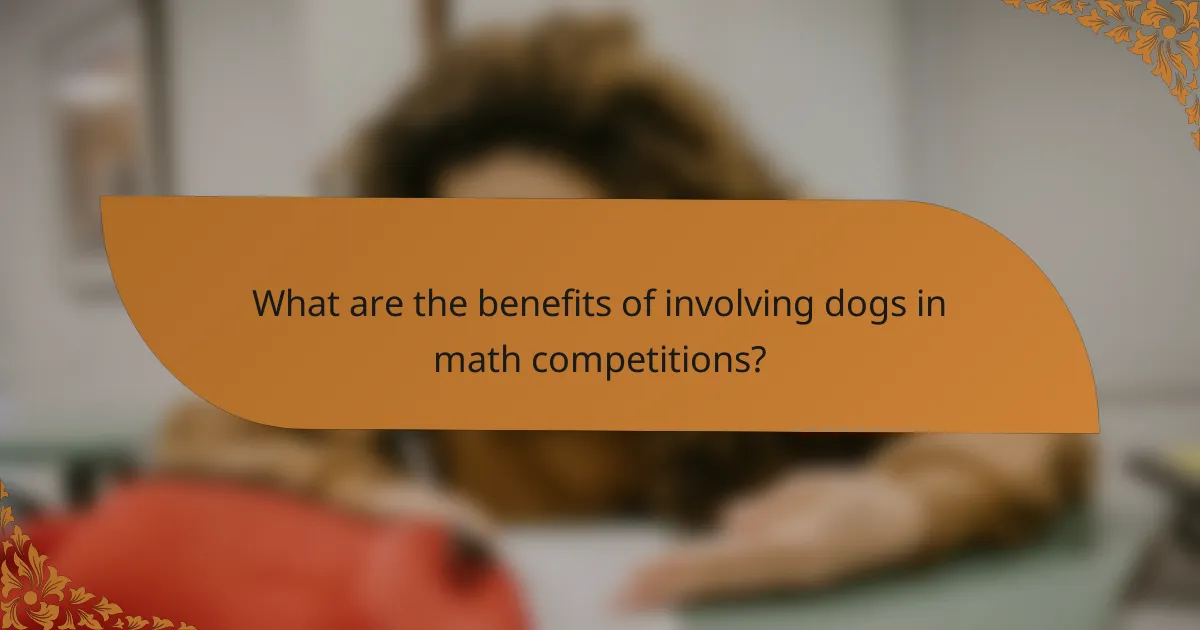
What are the benefits of involving dogs in math competitions?
Involving dogs in math competitions offers unique benefits, including enhanced cognitive skills for the dogs and strengthened bonds between dogs and their handlers. These activities not only stimulate the dogs mentally but also create a fun and engaging environment for both parties.
Enhancing cognitive skills in dogs
Math competitions for dogs often require them to solve problems or perform tasks that challenge their mental abilities. Engaging in these activities can improve a dog’s memory, problem-solving skills, and overall intelligence. For instance, tasks may involve recognizing patterns or responding to commands based on numerical cues.
Handlers can introduce various exercises that promote cognitive development, such as timed challenges or puzzles that require the dog to think critically. Regular participation in these competitions can lead to noticeable improvements in a dog’s ability to learn new commands and tasks.
Strengthening human-animal bonds
Participating in math competitions fosters a deeper connection between dogs and their handlers. The shared experience of training and competing creates opportunities for teamwork and communication, enhancing trust and understanding. This bond can lead to a more obedient and responsive dog.
Handlers should focus on positive reinforcement techniques during training sessions to build confidence and encourage a strong relationship. Celebrating small victories together during competitions can further solidify this bond, making the experience enjoyable for both the dog and the handler.
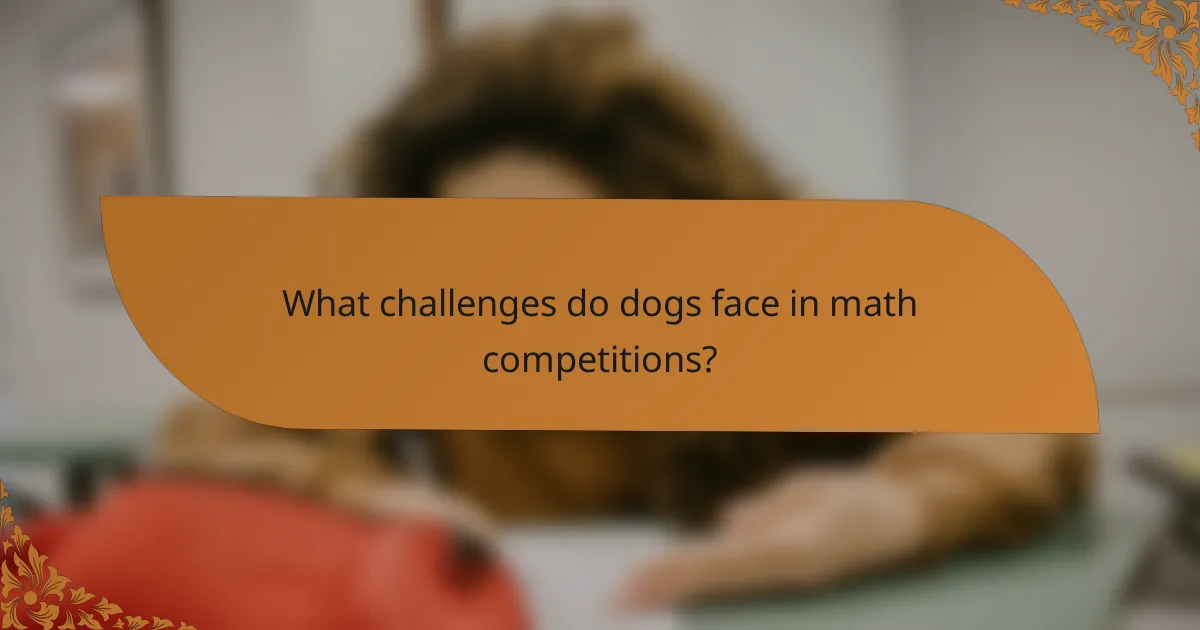
What challenges do dogs face in math competitions?
Dogs in math competitions encounter various challenges that can affect their performance. These challenges include understanding complex tasks, managing stress, and dealing with distractions in a competitive environment.
Common obstacles during competitions
One significant obstacle is the complexity of the tasks presented. Dogs must quickly interpret commands and solve problems, which can be mentally taxing. Additionally, the presence of other competing dogs can create a highly stimulating atmosphere that may overwhelm some participants.
Another challenge is the physical environment. Factors such as noise, unfamiliar settings, and the presence of spectators can distract dogs, making it difficult for them to focus on the tasks at hand. Training in varied environments can help mitigate these issues.
Handling stress and distractions
To effectively handle stress, it is crucial to acclimate dogs to competition settings through gradual exposure. This can involve practicing in environments that mimic competition conditions, allowing dogs to become familiar with potential distractions.
Additionally, employing techniques such as positive reinforcement can help dogs remain calm and focused. Simple strategies like using favorite toys or treats as rewards can encourage desirable behavior and reduce anxiety during competitions.
